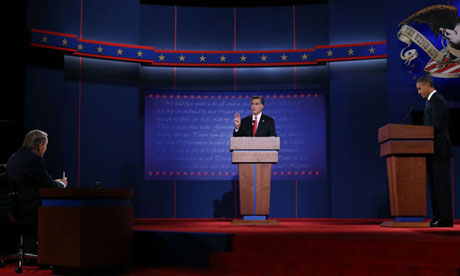After an insanely long campaign season, debates are the first opportunity we get to see Barack Obama and Mitt Romney on the same stage, thrashing out their differences in real time. And boy did they thrash last night.
The two presidential contenders traded jab after jab, and spent a whole lot of their time defending their positions in return.
Though the importance of debates has been contested, loads of Americans watch these things: 50 to 60 million viewers tuned in to the first debate last year – so they have some weight.
But in addition to "who won?" – the standard post-debate question – we want to know how "real" the exchange of ideas was, and what the debate revealed about the intentions of the candidates. Or for that matter, the priorities of the journalists asking the questions.
Starting with last night's showdown, we're breaking down each debate – and eventually all four debates too.
First we want to know: how are moderators framing the debates? And second: how are the candidates approaching them?
Here's what we found last night.
Navigate the decoder:
Framing the debate: Moderator Jim Lehrer's questions
• Questions in a graph
Candidates face off: Obama and Romney's answers
• Answers in a graph
• Romney v. Obama (by topic)
Notable moments | What's being said | Make the next debate better
The first 2012 presidential debate: domestic policy
Date | October 3, 2012
Air time | 9.00-10.30 pm ET
Location | University of Denver, Denver, Colorado
Sponsor | Commission on Presidential Debates
Moderator | Jim Lehrer (PBS NewsHour)
Framing the debate: Moderator Jim Lehrer's questions
Before the first debate, moderator Jim Lehrer issued a public statement that he had selected the very non-obvious topic of the economy for questions 1-3, and healthcare, the role of government and governing for the rest. If that list didn't excite you, neither would his disclaimer: "Subject to possible changes because of news developments ... not necessarily to be brought up in this order."
But despite early rumors of a foreign policy question slipping into the mix, Lehrer didn't change his questions breakdown for any "news developments." Beyond foreign policy – which gets its own debate later on – other hot button issues, such as immigration and women's rights were conspicuously missing from last night's show.
Here is a breakdown of Lehrer's question topics in a graphic. (We'll eventually add up the topics across debates to see what was covered overall, and what was left out.) #
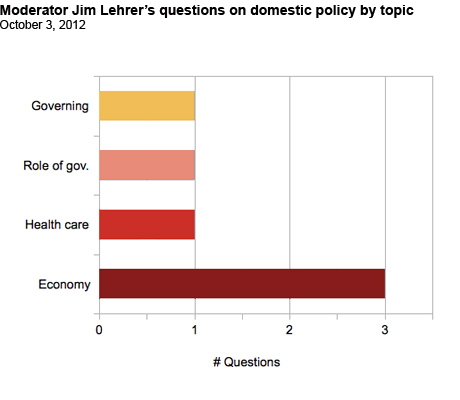
Lehrer's questions on the economy focused on three subjects only: jobs, national debt and entitlements. And on each he simply asked the candidates to define their differences. Lucky for Romney, he was ready.
The candidates then took over, as Lehrer essentially lost control of this debate from the get-go.
Viewers and voters should note that this debate is the only debate on domestic policy. However, the second presidential debate, which is held in a town hall style on October 16 will be open-ended.
See all the questions asked by Lehrer in the first presidential debate transcript.
Candidates face off: Obama and Romney's answers
We also tracked how Romney and Obama answered Lehrer's questions. Are they "building themselves up" by making references to past accomplishments and resume, or "tearing the other guy down" by launching attacks? Both have their place in politics, but it's useful to know which style the candidates are relying on.
Not counting the candidates' closing remarks, Romney and Obama clocked in eleven direct attacks each over the hour and a half long debate. Romney, who won the evening coin toss and chose to have the last word of the night, used his conclusion to cram in an extra four attacks against the president, while Obama held his tongue at the very end.
Obama, as the incumbent, did give us more background to go on. He referred to his accomplishments 10 times to Romney's paltry 4 mentions of his own record as Governor of Massachusetts.
We also tracked when candidates give us concrete plans and when they make promises for the future – two important indicators of how they would govern if elected.
Last night, both candidates were sparse on details – they gave us relatively few concrete plans for the future, and similarly offered few promises. They spent a lot more of their time on the attack and in defense.
It's notable that Romney, used his concluding remarks to pack in some punch with promises too. During the debate Romney made four promises to the American people, but then added five more promises in his final speech, speaking forcefully to define himself against the president.
You can see how their modes of debate break down in the chart below. Here's a quick key:
• Resume: What we define as "building yourself up." This is when candidates refer back to their own accomplishments and past experience
• Attacks: Also known as "Breaking the other guy down." This is when candidates make explicit jabs at an opponents' policy or character
• Promises: Any time the candidate makes intention statement: "I will" or "I want to."
• Plans: Any step-by-step solution to a specific question, such as "To fix the economy, I will..."
Barack Obama is denoted in blue and Mitt Romney is in red.#
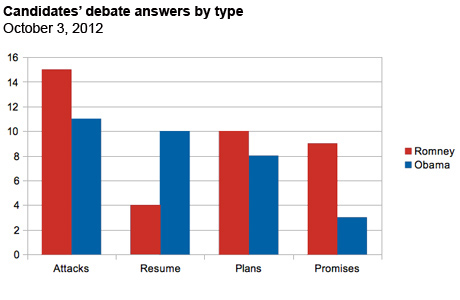
Plans and promises are the core of what the candidates are offering the American public--a blueprint for what the political future may hold. Though each was weak in this category, here's what Romney and Obama told us in last night's debate:#
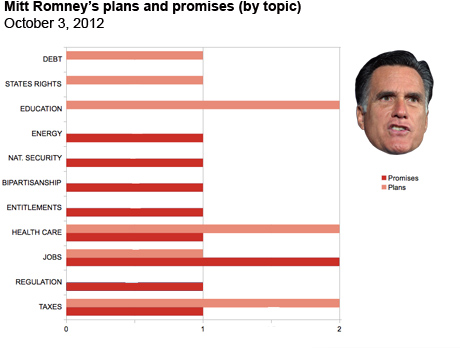
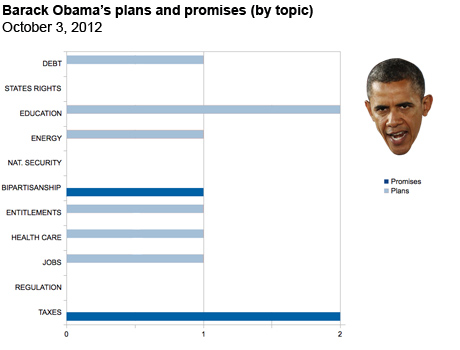
Few of the promises they did give us were mostly recycled material too.
You can explore a comprehensive list of the sorts of promises Obama and Romney have given the American people before the first debate here.
Notable moments, laugh lines and unexpected turns
Some other things that stuck out to us during this debate, include an early laugh line by Romney; his seemingly unnecessary reference to cutting PBS funding (and, at the same time, loving Big Bird); and Romney and Obama's keywords of the night.
Laugh lines: Who would have thought Mitt Romney would get in the only laugh line of the evening? He snuck in a joke at the very beginning when referring to President's 20th wedding anniversary, which fell on this first debate. After Obama announced it was the big night, Romney riffed:
I'm sure this was the most romantic place you could imagine here – here with me. So ... Congratulations
Unexpected turn: While outlining a plan to cut government spending, Mitt Romney said he'd cut unnecessary and wasteful programs. "Obamacare" was first on his list. Second, was PBS. Maybe facing Lehrer gave him the idea ...
I'm sorry, Jim, I'm going to stop the subsidy to PBS. I'm going to stop other things. I like PBS, I love Big Bird. Actually like you, too. But I'm not going to – I'm not going to keep on spending money on things to borrow money from China to pay for.
And of course the Big Bird reference caught on:

Keywords of the night:
Both Obama and Romney had some favorite topics last night that they returned to again and again. Obama hammered his connection to the middle class and how he believes "that we do best when the middle class is doing well." Romney tried to define Obama as a big-government-loving Liberal. The catchphrase he rolled out twice was "trickle-down government." Wonder if it'll stick?
Here's Romney:
The president has a view very similar to the view he had when he ran four years, that a bigger government, spending more, taxing more, regulating more -- if you will, trickle-down government -- would work. That's not the right answer for America. I'll restore the vitality that gets America working again. Thank you.
And what we're seeing right now is, in my view, a -- a trickle-down government approach, which has government thinking it can do a better job than free people pursuing their dreams.
What's being said about the debate
The Twittersphere was ablaze with discussion following the debate, but everyone agreed that there was one definite loser: debate moderator and PBS Newshour anchorman Jim Lehrer. His lackluster attempt to direct the conversation and keep the candidates on point invited criticism from around the web. Even Obama's deputy campaign manager, Stephanie Cutter, suggested that his presence wasn't as useful as it should have been, saying "I sometimes wondered if we even needed a moderator because we had Mitt Romney," she told CNN following the debate.
Mitt Romney made debate history tonight, when he inspired a social media onslaught after explaining that if elected he'd cut the funding for PBS and, as a result, add our beloved Big Bird to the list of unemployed Americans.
"I'm sorry Jim. I'm gonna stop the subsidy to PBS. I'm gonna stop other things," Romney said. "I like PBS, I like Big Bird, I actually like you too." Not long after, several Big Bird Twitter accounts popped up, lamenting his potential unemployment. Among them, @bigbird, who had some strong words for Mitt:
The overall impression is that Mitt Romney emerged from this debate in a better place than he started off. A CNN POLL of viewing voters revealed that 67% say Romney won and only 25% say Obama. A blowout. Richard Adams, the Guardian's US Politics live blogger agreed.
But while Obama's performance may have been subdued, there's nothing he said tonight that resembles a hostage to fortune, no slips or gaffes, nothing for attack ad fodder. So that suggests the damage won't be lasting. But as I mentioned below, the Obama campaign with a better performance – and a wider range of questions – could have killed off Mitt Romney's candidacy. They didn't, he's on the rebound, and we still have five weeks to go.
Make the next debate better
What's your take on the first debate? Use the comment section below to discuss with Guardian readers and reporters. Live blogger Richard Adams will be reading this comment thread, so don't be surprised if some of the discussion here lands back on his live blog.
We've also teamed up with the Personal Democracy Forum's Good Questions Project, which aims to aggregate examples of good (or bad) questions being asked of the candidates in public. Show your support for the best questions asked last night by tweeting with #GoodQ. Suggest questions for future debates using the same hashtag.
